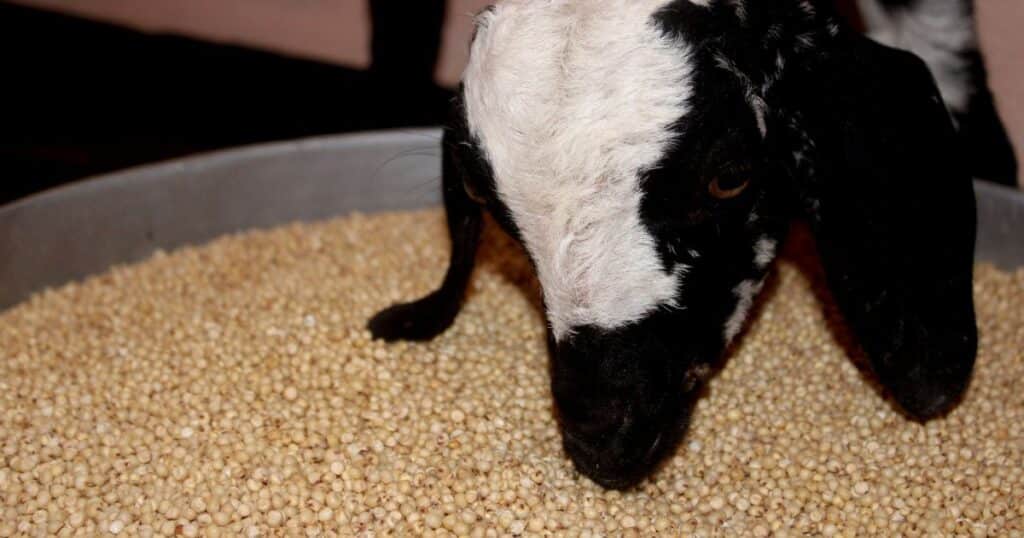Hemp, a plant that has been around for ages, is gaining renewed attention in the field of agriculture. Prairie View A&M University (PVAMU) will be at the forefront of researching this versatile crop thanks to a grant from the USDA’s National Institute of Food and Agriculture.
The nearly $300K grant awarded to Dr. Negusse Kidane, an assistant professor and research scientist at PVAMU, will fund a three-year study on the potential of hemp biomass byproducts as animal feed for goats. This research has the potential to not only improve animal nutrition but also have a significant impact on the environment and economic sectors.

Animal feed plays a crucial role in global supply chains, providing the necessary nutrition for livestock and poultry production. However, traditional grain feed production comes with its own set of challenges, such as high costs and impacts on the environment. In recent years, there has been a growing interest in exploring alternative sources of animal feed that are more sustainable and cost-effective. This is where hemp comes into play.
Hemp, which is a variety of the Cannabis sativa plant species, has been traditionally used for its fibers and seeds. However, with its recent legalization in the United States, researchers are now examining its potential as animal feed. Rich in protein and essential fatty acids, hemp holds promise as a nutritious and eco-friendly alternative to traditional grain feed. These qualities make it an ideal candidate for further research and development in the field of animal nutrition.
The Grant and Its Impact
In June, Dr. Kidane was awarded a grant from the USDA’s National Institute of Food and Agriculture amounting to nearly $300K for his research on hemp byproducts as animal feed. Over the course of three years, Dr. Kidane and his team will study the nutritional profile of hemp biomass byproducts and their effects on goat health and production.
The outcomes of this research have the potential to improve animal nutrition and positively impact the environment and economic sectors. By using a sustainable crop like hemp as animal feed, we can reduce our reliance on traditional grain feed production methods that can have harmful effects on the environment. Furthermore, this research could create new opportunities for hemp growers and contribute to the growth of the agricultural industry as a whole.
“This grant represents a significant milestone in our pursuit of innovative solutions for sustainable agriculture. By exploring the potential of hemp as an alternative to traditional grain in animal feed, our researcher will spearhead groundbreaking research that not only addresses pressing environmental challenges but also contributes to the advancement of animal nutrition,” said PVAMU Vice President of Research and Innovation Magesh Rajan, Ph.D., P.E., MBA.
The Road to Legalization of Hemp
For many decades, hemp was classified as a controlled substance in the United States and was prohibited from being grown commercially. However, with the passing of the 2018 Farm Bill, hemp was officially removed from the list of controlled substances and is now considered an agricultural commodity. This change in legislation has opened up new opportunities for research and development of hemp-based products, including its use as animal feed.
This has benefited hemp growers and researchers like Dr. Kidane, who can now explore the full potential of this versatile crop. The legalization of hemp has also sparked interest among stakeholders in various industries, from farmers and processors to textile manufacturers and animal nutritionists.
Collaborative Efforts at PVAMU
The success of this research project would not be possible without the collaborative efforts of a team of experts at PVAMU. Along with Dr. Kidane, other professors and students from various departments, such as agriculture, biology, chemistry, and nutrition, contribute their knowledge and expertise to this project.
Additionally, PVAMU is partnering with other research institutions to gather diverse data and insights. This collaborative effort between different departments and institutions is crucial for conducting comprehensive and successful research projects that can significantly impact society.
“The involvement of six multi-disciplinary scientists from PVAMU’s academic and research programs demonstrates the team’s commitment to partnership and efficient use of resources. The project also fosters academic and industrial collaboration, such as with goat producers, hemp farmers and hemp processing industries across Texas,” Dr. Kidane said. “Given the breadth and scope of the study, a collaborative approach is indispensable for the success of this proposed project, requiring synergistic efforts from scientists in multiple disciplines.”

While the current study focuses on using hemp biomass byproducts as animal feed for goats, its potential implications extend beyond just one animal species. With further research, we could discover new applications for hemp in the field of animal nutrition and expand it to other species, such as poultry and swine. The outcomes of this research could also lead to the development of new hemp-based products, contributing to a more sustainable and eco-friendly agricultural industry.
Overall, the future looks promising for both the agriculture industry and the environment, with potential outcomes from this study at PVAMU. So, we can conclude that Prairie View University’s efforts in exploring hemp as animal feed have the potential to bring significant benefits to the agriculture industry and society as a whole. With ongoing research and collaboration, we may soon see hemp becoming a staple in animal nutrition and contributing to a more sustainable future.
Enjoyed that first hit? Come chill with us every week at the Friday Sesh for a freshly packed bowl of the week’s best cannabis news!


















